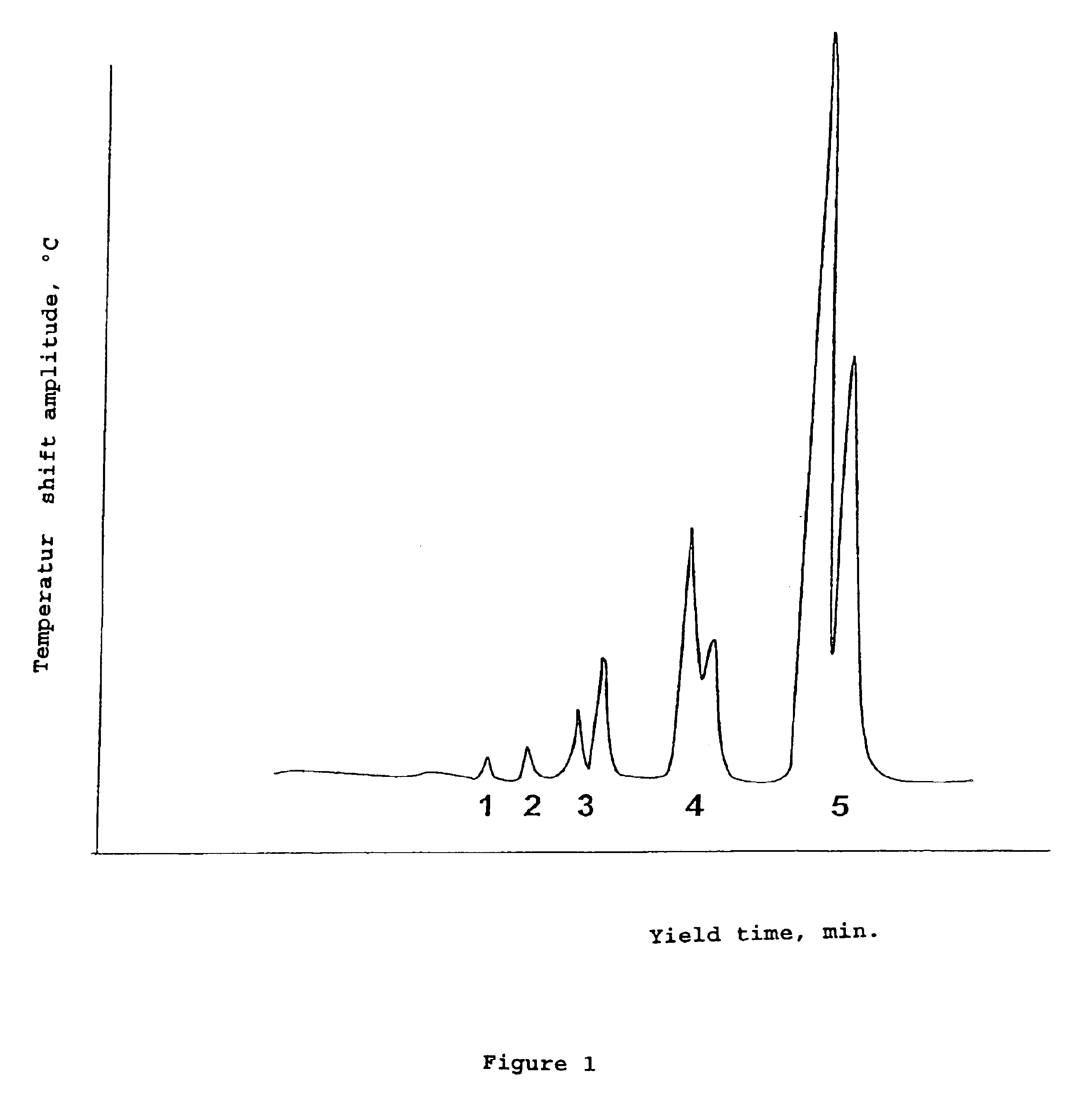Perfluoronated cycle-containing tertiary amines used as a basis for gas-conveying emulsions and device for the production thereof
a technology of tertiary amines and perfluoronated cycle-containing amines, which is applied in the field of chemistry of fluororganic compounds, can solve the problems of insufficient stability of such a emulsion, impose essential limitations on the commercial preparation of this compound, and difficulty in using this compound individually, so as to improve the stability of emulsions
- Summary
- Abstract
- Description
- Claims
- Application Information
AI Technical Summary
Benefits of technology
Problems solved by technology
Method used
Image
Examples
example 2
The Use of TPFCA
The completely fluorinated products obtained as described in Example 1 were used for preparing a submicron emulsion containing 10 vol. % of TPFCA, 3 wt. % of an ethylene oxide-propylene oxide block copolymer and an aqueous solution of salts isotonic to blood plasma (120 mM of MaCl, 10 Mm of NaHCO3, 2 mM of KH2PO4, 5 mM of KCl, 2 mM of CaCl2), with 10 mM of glucose, 1 mM of sodium succinate, 1 mM of sodium pyruvate, 1 mM of sodium 2-hydroxybutyrate (perfusate pH 7.40). With the help of the produced emulsion, an isolated dog kidney was perfused under recirculation normothermal conditions (1 liter of the perfusate per 40 g of the kidney). The vital activity of the organ was maintained for 24 hours, replacing the perfusion composition every 6 hours, without damage to cell membranes (without edema, without substantial growth of the capillary resistance, with the perfusate pH being preserved, and without a drop of the oxygen consumption rate).
example 3
The Use of TPFCA
A mixture of the TPFCAs prepared as described in Example 1 with perfluorodecalin in a 1:2 ratio was used for preparing a submicron emulsion containing 10 vol. % of a fluorocarbon phase, 4 wt. % of an ethylene oxide-propylene oxide block copolymer, and an aqueous solution of salts isotonic to blood plasma (120 mM of NaCl, 8 mM of NaHCO3, 1.2 mM of KH2PO4, 5 mM KCl), with 10 mM of glucose. The obtained emulsion was used for isovolumetric substitution of 65% of the volume of circulating blood in 10 rats under general anesthesia with premedication, with oxygen-enriched air being supplied to the animals for breathing in the course of the operation and during the first 24 hours after the blood substitution. All the animals which have undergone blood substitution, survived.
example 4
The Use of TPFCA
TPFCA in a mixture with perfluorodecalin were used for the preparation of a submicron emulsion as described in Example 3. The prepared emulsion was administered intravenously to ten 2.5-3.5 kg bodyweight rabbits in a dosage of 20 ml per kg. The deviation of the body temperature in the rabbits after the administration of the emulsion did not exceed 0.3° C. No symptoms of allergic reactions were observed. The content of leukocytes in the peripheral blood lowered by not more than 5% of the initial one, this being also indicative of the preparation being not reactogenic. All the rabbits successfully survived the critical period of 80 days (the period during which all the rabbits die, if an emulsion of pure perfluorodecalin is administered to them). No pathological abnormalities were found in the animals throughout the follow-up period (of more than 1 year).
TABLE 1Comparison of the toxicity* of individual perfluoro-N-(4-methylcyclohexyl)-piperidine (PFMCP) and of a mixtur...
PUM
| Property | Measurement | Unit |
|---|---|---|
| physicochemical properties | aaaaa | aaaaa |
Abstract
Description
Claims
Application Information
 Login to View More
Login to View More - R&D
- Intellectual Property
- Life Sciences
- Materials
- Tech Scout
- Unparalleled Data Quality
- Higher Quality Content
- 60% Fewer Hallucinations
Browse by: Latest US Patents, China's latest patents, Technical Efficacy Thesaurus, Application Domain, Technology Topic, Popular Technical Reports.
© 2025 PatSnap. All rights reserved.Legal|Privacy policy|Modern Slavery Act Transparency Statement|Sitemap|About US| Contact US: help@patsnap.com



